#this primitive duality of man {jekyll and hyde}
Explore tagged Tumblr posts
Text


PENNY DREADFUL SERIES: Materialist

...is a short series of oneshots combining nsfw/smut content with some typical horror elements... (please MDNI and make sure to read the warning tags before opening if you're not comfortable with dark themes). Each of the following episodes combines one of the Jjk men with a gothic novel and a kink.
I am honored to announce that this series is part of the SPOOKINKY event, created by @tsukimefuku , whom I would like to thank for hosting this brilliant initiative!
Hope you'll enjoy it!

~Where does Penny Dreadful come from?~
Penny dreadfuls were cheap popular serial literature produced during the 19th century in the United Kingdom.
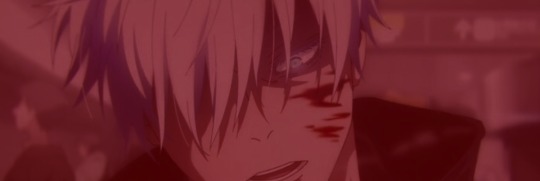
VIII. THE MOON (GOJO SATORU x DR JEKYLL and MR. HYDE x car sex )
"I learned to recognise the thorough and primitive duality of man; I saw that, of the two natures that contended in the field of my consciousness, even if I could rightly be said to be either, it was only because I was radically both.""

The Perfume (CHOSO KAMO x Perfume: the Story of a Murderer x Olfactophilia)
"For people could close their eyes to greatness, to horrors, to beauty, and their ears to melodies or deceiving words. But they couldn't escape scent. For scent was a brother of breath. Together with breath it entered human beings, who couldn't defend themselves against it, not if they wanted to live. And scent entered into their very core, went directly to their hearts, and decided for good and all between affection and contempt, disgust and lust, love and hate. He who ruled scent ruled the hearts of men."
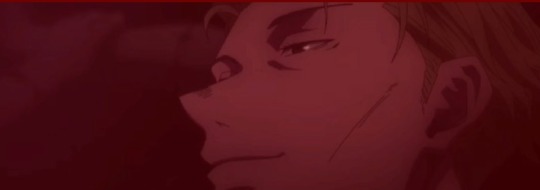
The Hidden Reflection of the Darkness Within (NANAMI KENTO X The Picture of Dorian Gray x Katoptronophilia)
"Behind every exquisite thing that existed, there was something tragic (...)Nowadays people know the price of everything and the value of nothing."

A Question of Faith (GETO +SUKUNA x 'Interview with the Vampire x Corruption kink)
"Evil is a point of view. We are immortal. And what we have before us are the rich feasts that conscience cannot appreciate and mortal men cannot know without regret."

#Spookinky2024#halloween#kinkoctober#jjk#jujutsu kaisen#pennydreadfulseries#jjk x reader#jjk smut#jjk fluff#jjk fandom#jjk x reader smut#jjk x you#jjk x y/n#jjk headcanons#jjk oneshot#jjk imagines#jjk scenarios#gojo satoru#gojo#nanami kento#nanami kento x reader#nanami jjk#choso kamo#choso kamo x reader#jjk choso#geto suguru#geto jjk#geto x reader#sukuna x y/n#ryomen sukuna
43 notes
·
View notes
Text
In each of us, there are two natures. If this primitive duality of man—good and evil—could be housed in separate identities, life would be relieved of all that is unbearable. It is the curse of mankind that these polar twins should be constantly struggling... - The Strange Case Of Dr Jekyll And Mr Hyde (prologue)
11 notes
·
View notes
Text
Jekyll was so right about the primitive duality of man. There's no other explanation for the contrast between all the things I write when I'm sleep deprived.
Prime example:
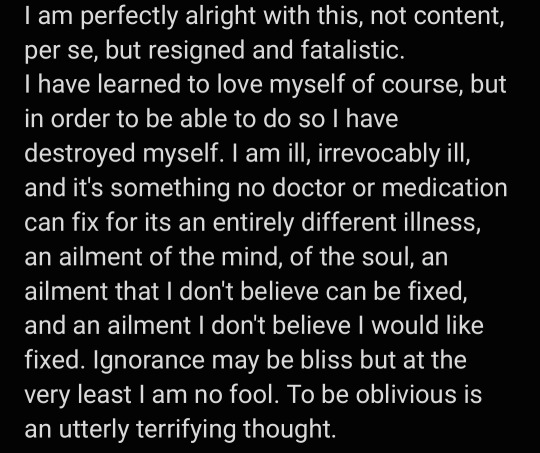

What's even better is that I don't remember the context behind either of these! Sleep deprived Charlie scares me. They are the (occasionally weirdly poetic) Hyde to my Jekyll.
Edit: the scariest part of it was definitely the punctuation. What the fuck was I doing with the placement of those commas?
19 notes
·
View notes
Text
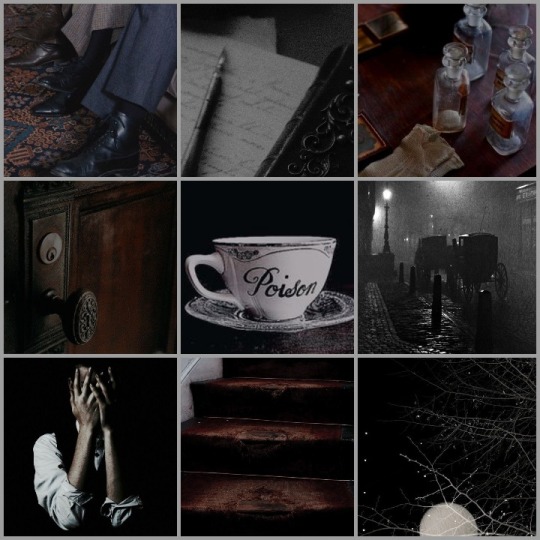
“I learned to recognise the thorough and primitive duality of man; I saw that, of the two natures that contended in the field of my consciousness, even if I could rightly be said to be either, it was only because I was radically both.” - R. L. Stevenson "The Strange Case of Dr. Jekyll and Mr. Hyde"
#picsart#collage art#books and reading#horror story#robert louis stevenson#the strange case of dr jekyll and mr hyde#dark aesthetic#human nature#duality of man#dark art#творю и вытворяю#коллаж
15 notes
·
View notes
Text
I learned to recognise the thorough and primitive duality of man; I saw that, of the two natures that contended in the field of my consciousness, even if I could rightly be said to be either, it was only because I was radically both. […] In the agonised womb of consciousness, these polar twins should be continuously struggling.
— Robert Louis Stevenson, Strange Case of Dr Jekyll and Mr Hyde and Other Tales, (2008)
5 notes
·
View notes
Text
the strange case of dr jekyll & mr hyde VS the picture of dorian gray
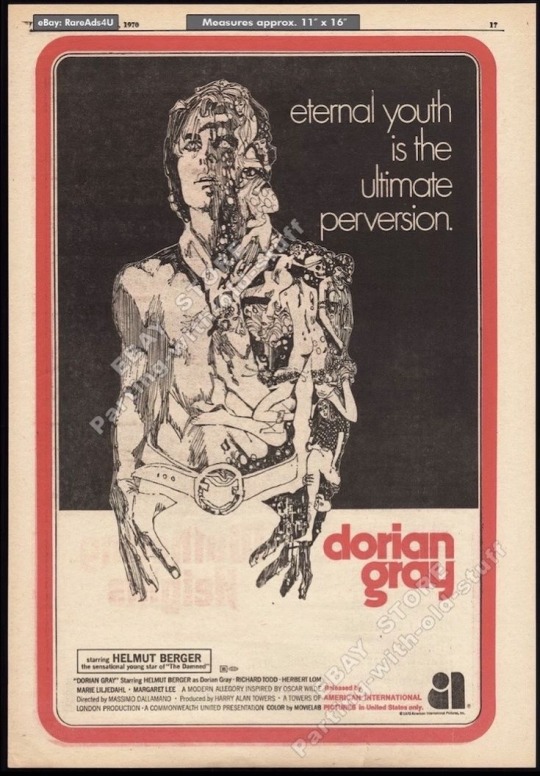
The topic these two novels center around is the way good and evil coexist within a person. More specifically, they are about what it would be like if they were to be separated, polarizing all of the good and all of the evil in two separate identities. “all human beings, as we meet them, are commingled out of good and evil”. The difference is that in the picture of dorian gray it is not only a matter of morality, but one of external beauty as well. His second identity, therefore, shows in his appearance the consequences of all of the evil Dorian has done, while his alive self keeps his beauty, which hides his viciousness.
In both books there is another man, moved by affection, who tries to unsolve the mystery, in order to help a “friend” who they fear to be on the verge of derangement. But these two men are profoundly different: Mr Utterson is a determined man who doesn’t take no as an answer and won’t stop until he finds out who or what is tormenting his Jekyll. Basil Hallward, on the other hand, is a character who is in constant agony, tension and suffering for his beloved friend, who he is the biggest victim of. He doesn’t ever think about saving himself from Dorian, but dies to save Dorian from Dorian himself.
Dr Jekill and Dorian Gray have many differences as well, starting from the reason that leads them into this spiral of chaos: There is maturity and consciousness in jekyll’s actions, even though we cannot deny that this evolves into a complete loss of control. His intentions are good, but they get out of hand.
Dorian, on the other hand, starts off with evil intentions, and they will turn even worse as the story evolves. He acts out of fear and insecurity, and he dies of these same feelings. Both men die, killed by their evil side, who ultimately took over, but the way they get to this point is completely different. While jekyll takes curiosity way too far, and drowns in the attempt to go as deep as possible in the nature of the human being, Dorian suffocates on its surface, he tries to stay as away as possible from his own introspection, his feelings and even his thoughts, trying to restrain his paranoia until it ends up suffocating him. Jekyll dies out of a sense of responsibility: he knows he took it too far, he understands that he can’t live in that lie forever, and humbly surrenders. Dorian fights to the very end to keep his power and dies in this battle against himself.
Both men have a side of themselves that jekyll describes a “child of hell” who “ had nothing human, nothing lived in him but fear and hatred”. Fear and hatred is what they feed on, and eventually what they choke on. They live on the run, the run from people, from justice, from those who love them, from themselves, from their nature, from responsibility, and at some point they trip and collapse.
While Jekyll surrenders to Hyde, Dorian tries to defeat his alter ego. While jekyll knows that his alter ego is himself (“I learned to recognise the thorough and primitive duality of man; I saw that, of the two natures that contended in the field of my consciousness, even if I could rightly be said to be either, it was only because I was radically both”) and that he must kill himself to kill hyde, Dorian thinks he can simply get rid of the painting and continue being untouchable, become undefiable. And that is what kills him: excess, exaggeration, always wanting more, never being satisfied, never feeling safe. He does not understand that he is the picture more than he is his body, or refuses to, and his blindness stabs him dead.
#the strange case of dr jekyll and mr hyde#robert louis stevenson#the picture of dorian gray#oscar wilde#queer#queer literature#gothic literature#english literature#essay
2 notes
·
View notes
Note
(I hope this is okay! I had this idea and thought it would be cool to have a vampire Lucy with Jekyll for Halloween!) It had happened so fast, this encounter with a most mysterious stranger, before Lucy had awakened in almost a fog like state. She felt weak and her throat was extremely sensitive and sore. Whatever she had done last night had been more fierce than her normal clientele. Feeling as though she needed help, Lucy went to the one person who promised to help her- Dr. Jekyll.
Jekyll hadn’t left his lab in weeks. He was so close to a breakthrough, he couldn’t bear to leave his work behind. Yet when Poole announced that the lovely young lady from the Red Rat was at his doorstep, he raced up from the cellar. His hair was a mess and it looked like he hadn’t been sleeping, but his blue eyes were still bright. “Miss Harris. It’s lovely to see you again. What can I do for you?”
193 notes
·
View notes
Text
Enemies of the State
Summary:
You can be enemies and lovers.
The two labels are not exclusive.
(Or 'B may work for the state but he isn't his brother.')
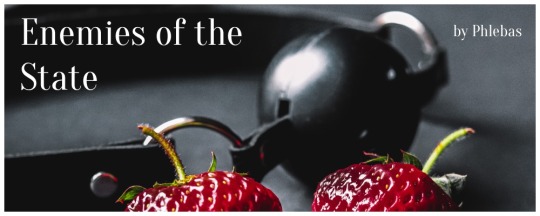
Rating: Explicit Fandom: Naruto Relationship: Hoshikgaki Kisame/Killer Bee/Samehada Word Count: 1355 (Complete)
Entry for @narutorarepairweek
Day 5 - September 22: Enemies of the State | Fluff Roulette
This story is for @rowanishere who suggested the gag and @hidendumbassvillage who came up with Bee's rap response to Kisame's proposition. It's also for @longliveustherecklessandthebrave, @blightowl and @ampthetv who helped me work out what Kisame and Samehada's tongue might feel like when they fuse.
Thank you all.
Truly, it takes a village.
The chapter titles come from the Strange Case of Dr Jekyll and Mr Hyde.
It was on the moral side, and in my own person, that I learned to recognise the thorough and primitive duality of man; I saw that, of the two natures that contended in the field of my consciousness, even if I could rightly be said to be either, it was only because I was radically both.
B tongues the gag in his mouth thoughtfully.
This isn't the first time he's had sex, it's not even the first time he's had sex with Samehada.
But it is the first time he's had sex with Kisame.
Read the rest on AO3.
#narutorarepairweek2022#Day Five#Enemies of the State#Hoshikgaki Kisame/Killer Bee/Samehada#Hoshikgaki Kisame#Killer Bee#Samehada#TW: Teratophilia#TW: Human/Monster Romance#TW: Monster/Monster Romance#Phlebas Writes#Naruto#fanfiction#Story: Enemies of the State#Series: Naruto RarePair Week 2022
8 notes
·
View notes
Text

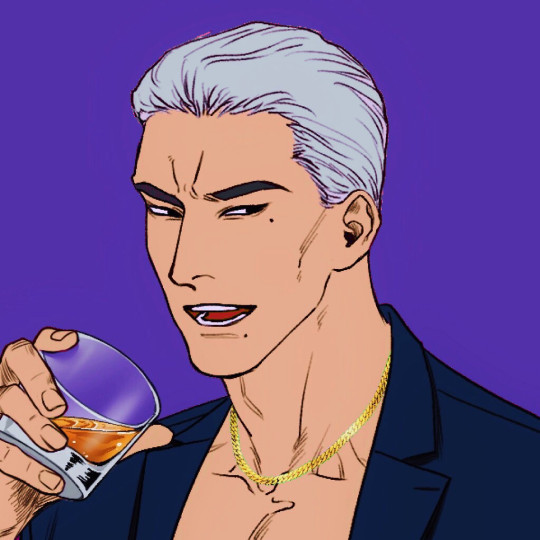
The Nakamura Group & The Jingweon Mafia
“I learned to recognise the thorough and primitive duality of man; I saw that, of the two natures that contended in the field of my consciousness, even if I could rightly be said to be either, it was only because I was radically both.” - Jekyll & Hyde
Takuma: me
Han Joon-gi: @mugunghwc
7 notes
·
View notes
Text
2021 READING LIST
2. The Strange Case of Dr. Jekyll and Mr. Hyde by Robert Louis Stevenson
My rating: 3/5
Favourite quotes:
“If I am the chief of sinners, I am the chief of sufferers also.”
“With every day, and from both sides of my intelligence, the moral and the intellectual, I thus drew steadily nearer to the truth, by whose partial discovery I have been doomed to such a dreadful shipwreck: that man is not truly one, but truly two.”
“I was coming home from some place at the end of the world, about three o’clock of a black winter morning, and my way lay through a part of town where there was literally nothing to be seen but lamps.”
“I learned to recognise the thorough and primitive duality of man; I saw that, of the two natures that contended in the field of my consciousness, even if I could rightly be said to be either, it was only because I was radically both.”
6 notes
·
View notes
Photo


"I find myself wondering which is more important: the man I used to be or the man I've become."

“It was on the moral side, and in my own person, that I learned to recognise the thorough and primitive duality of man; I saw that, of the two natures that contended in the field of my consciousness, even if I could rightly be said to be either, it was only because I was radically both.” ― The Strange Case of Dr. Jekyll and Mr. Hyde
So I accidentally took for.ev.er. to post this which is actually an injustice?? I had the amazing opportunity to commission @iaraiumi for a piece featuring my favorite tragic murder son Cynbel and his amnesiac identity Cadence Smith. I had no idea what I wanted from this piece―with this being my first actual commission and all―and boy did she blow any expectations out of the water anyway! Go check her out ― she’s an awesome person and artist and honestly?? god tier combo. Thank you again for this!! *Cynbel/Cadence is a Bloodbound-based OC from my fic series Oblivion Bound, find out more [here].
#playchoices fanart#bloodbound#choices bb#choices fanart#iaraiumi#oc: cynbel#oc: cadence smith#fic: oblivion bound
12 notes
·
View notes
Photo

“I learned to recognise the thorough and primitive duality of man; I saw that, of the two natures that contended in the field of my consciousness, even if I could rightly be said to be either, it was only because I was radically both.” - Robert Louis Stevenson, The Strange Case of Dr. Jekyll and Mr. Hyde okay so huge LEGO Movie 2 spoilers here but this makes sense right? I had the idea in my head for a while now so I whipped it up yesterday haha ^^
#my art#fan art#the lego movie#the strange case of dr. jekyll and mr. hyde#the lego movie 2#dr jekyll and mr hyde#emmet brickowski#rex dangervest#halloween#au#jekyll and hyde#blood //#tlm2 spoilers
30 notes
·
View notes
Text
Ougi and Araragi
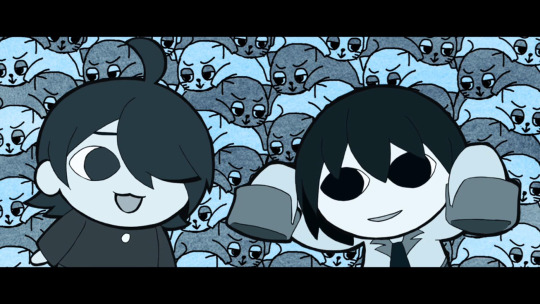
Hi! I was wondering if you could write a meta about Ougi from the Monogatari series.
It’s impossible to talk about one of them without talking about the other, so let’s discuss the unique relationship between Ougi and Araragi underneath the cut, the special relationship between a boy and his shadow.
1. Character Concept: The Jungian Shadow
There’s a lot that can be discerned about Ougi just from the type of character they are. Their relationship with Araragi defines them entirely, without Araragi there is no Ougi.
Ougi’s design is intentionally meant to parallel Araragi’s. Araragi has a very bland light novel protagonist kind of look to him (hence why he never gets any cover art) his only distinguishing feature is that his hair is styled to cover one eye at almost all times. This is because Araragi’s primary character trait is obfuscation looking at things through only one eye you are never going to get the entire picture.
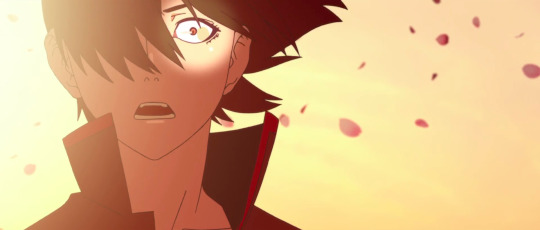
If Araragi’s character design is plain and normal, because that is what the primary protagonist type of these kind of series are an ordinary high school boy, then Ougi’s is the opposite, their design is attention grabbing and unique. If Araragi is normal, Ougi is visibly abnormal, you can already tell there is something subtly off by looking at them. What Araragi hides underneath the surface, Ougi is.
The primary feature of Ougi’s face and the one you notice immediately is their eyes, large, dull eyes, which are the focus of their entire face. Ougi is always shown staring forward with those eyes, unblinking, directly at you. It’s symbolic, eyes are symbols of insight, if Araragi obfuscates then Ougi sees everything. Ougi also wears the Naoetsu high girls uniform. They take the appearance of what Araragi cares about the most, a girl that he can save. Their skin is pale, and their hair dark, which could mean two things, either black and white, light and shadow kind of thinking that Ougi represents or, it’s just supposed to make them look like the kind of ghost that is common in Japanese horror.
Finally, Ougi’s sleeves are so long that their hands are almost never shown. This indicates two things, one human hands are signs of intimacy. What are your hands for? is a pretty famous quote from Evangelion, by never showing their hands Ougi cuts off intimacy because they exist as a symbol of isolation. The next is that Araragi is characterized as someone who always reaches out a helping hand, whereas Ougi is the opposite they stress individual agency and often leave others like Nadeko to their own fate. They may orchestrate things from the shadows, but ultimately Ougi never directly acts, and let’s the characters decide to step off the cliff all by themselves.
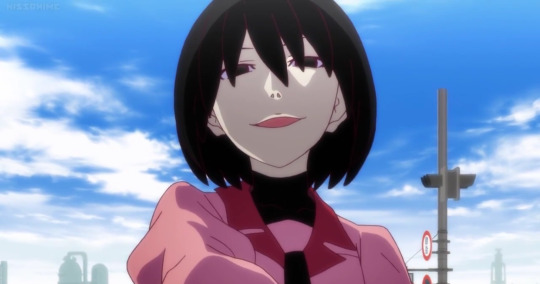
The fact that Araragi a boy, makes Ougi appear as a girl is also a play on binary gender. Ougi is technically genderless, but they appear as a girl initially because themes of binary opposition, and black and white thinking are at play in their character. Araragi is someone who tends to see the world in a binary way. Light and dark, black and white, male and female, they assume there is some kind of proper order to the world that needs to be followed. When Araragi begins to let go of these ideas Ougi is freer to express their gender any way they like.
A binary opposition (also binary system) is a pair of related terms or concepts that are opposite in meaning. Binary opposition is the system of language and/or thought by which two theoretical opposites are strictly defined and set off against one another.
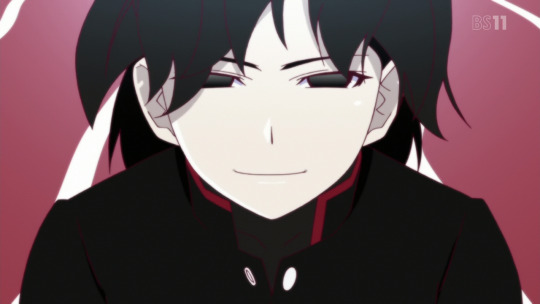
Ougi is based primarily on two ideas. One of them is a pretty obvious reference to the King of Distortion from Boogiepop, which is the series which started what we now call ‘Light Novels’ in Japan by popularizing urban stories with heavy sci-fi or fantasy elements. Araragi even directly references the king of Distortion.
“Tell me, what are you thinking about now...?” “Don’t suddenly become the king of Distortion.” Out with the cool quotes, scolded my sister. I deeply reflected on it. (Nekomonogatari White).’
The king of Distortion is a character who’s physical appearance and personality changes with every character they interact with, and who is able to enter the dreams of other people and see the desires in their heart after which point he makes an attempt to correct them.
While the King's personality changes with whatever person's form he is taking, in general, he seems to share a soft-spoken, calm and collected attitude each time, always seeming confident, most likely because of his knowledge of distortions in the hearts of each person's subconcious he enters. He claims his goal to be to 'turn the people's suffering into gold', which involves having people deal with their inner turmoils and coming to terms with them, which is why Boogiepop does not consider the King an enemy of the world, as he doesn't truly do anything particularly villainous.
King of Distortion like Ougi is also born from a single character’s regrets. The King of Distortion was born the moment Shirou Tanaka arrived at the Moon Temple. The main cause for the King's creation was the pent-up regret Shirou felt after entering a relationship with Naoko Kamishiro even though he didn't love her, figuring that he would just develop feelings for her later. After the girl's death, Shirou's self-hatred grew as he realized he wasn't particularly affected by her death in any real way. These feelings were also amplified by the fact that he knew about Akio Kimura, someone who truly loved Naoko, and deserved her way more than himself. These complex feelings of his manifested as the King of Distortion, a being born from Shirou's MPLS evolution.
King of Distortion is an entity born from repressed regrets and self hatred, what a character refuses to acknowledge about themselves or confront. Therefore, both King and Ougi are Jungian shadow archetypes.
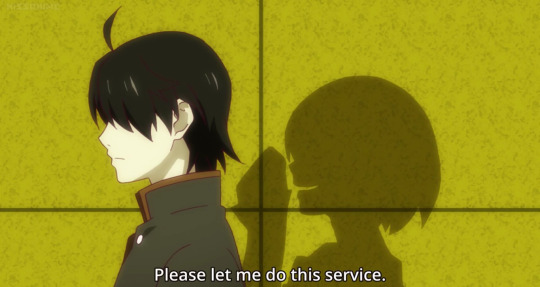
Both as one, one as both.
One is both, both are one.
The Niounomiya siblings with their slaughtering magic.
He and she pass their time in the same body.
Passing their shuttered time.
Passing their shuttered space.
She is Jekyll, and he is Hyde.
One as both, both as one.
Both are one, one is both. Hitokui Magical - [x].
Robert Louis Stevenson wrote the now famous tale, The Strange Case of Dr. Jekyll and Mr. Hyde, a story famous for its astute psychological insight that “Man is not truly one, but truly two.”
In Stevenson’s novel, Dr. Jekyll is a well respected doctor who cares deeply about the admiration of others and strives to be a good human being. In his laboratory he concocts a potion that when ingested transforms him into Mr. Hyde a primitive, unruly and destructive man. Reflecting on the nature of his transformation, he discovers a truth about the nature of a human being.
“I learned to recognize the thorough and primitive duality of man; I saw that, of the two natures that contended in the field of my consciousness, even if I could be rightly said to be the either, it was only because I was radically both.” [Source.]
The shadow exists in a dual relationship with the persona, developing in turn with it. In Jung’s terms the self, is the sum total of the psyche. Both is one, and one is both.
The persona comes from the latin word for “mask”, it’s the elements of personality which arises “for reasons of adaptation or personal convenience.” [Source.] It’s a simple idea, the way you talk around your friends is different from the way you talk in front of your grandmother. People are constantly choosing consciously which parts of their personality to show in front of others, especially in relation to how they would like to be perceived. It is a performance, but that does not mean it is not real. Every part of the identity matters.
It leans heavily on embodying only one’s best qualities, leaivng all those negative traits which contradict the Persona to form the “Shadow.” Jung called the shadow the part of the psyche the unconscoius aspect of the personality. Because one tends to reject or remain ignorant of the least desirable aspeccts of one’s personality, the shadow is largely negative. It consists of everything which exists outside of the light of consciousness, but it can be both positive and negative. “Everyone carries a shadow”, Jung wrote, “And the less it is embodied in a person’s life, the blacker and denser it is.” The shadow is unscious, things which our mind experiences but we cannot control, dreams, desires, instincts.
Without a well developed shadow, a person can easily become shallow and extremely preoccupied with the opinions of others, much like how we see Araragi act in Monogatari. Jung believed that, not wanting to look at their shadows directly, many people project those flaws onto other people.
In terms of literary theory then, the Jungian Shadow archetype is a character who is made up of all the flaws that the protagonist refuses to confront. They challenge the protagonist merely by existing, because the protagonist wants to look away and leave those qualities unacknowledged. Often, they are an antagonist merely because the protagonist projects all of the flaws they cannot see into themselves, onto that other person.
2. Araragi Koyomi - He Obfuscates
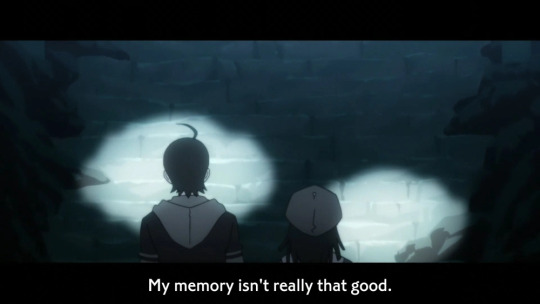
It is impossible to see the shadow without the light. It is impossible to describe Ougi without first talking about Araragi Koyomi. Just like Ougi, let’s start with the origins of his character. While this is just my own personal speculation I’m not NisioIsin, Araragi has always read as written in response to two things to me: First Ii-chan, the protagonist of his first series Zaregoto, and second harem protagonists in general.
II-chan and Araragi are both very flawed and non-confrontational human beings, but whereas Zaregoto is a story about how II-chan really does not want to change himself and instead just kind of wants to stay treading water, wants to never cause any more ripples, wants to hold onto the fragile sense of self he has Araragi’s is a story of a bad and hypocritical, shallow kind of person striving to grow up and become a good person, acquire depth.
The stereotypical harem protagonist is this, a plain guy with no personality who somehow gets girls to fall all over him, often for showing them the bare minimum of kindness. Monogatari is partially a deconstruction of harem series because it shows the kind of circumstances that would cause all these girls to fall all over one guy, literally they are all so deprive of affection that the smallest show of kindness does actually make them fixate on Araragi.
The thing is Araragi does have a clear personality. He is very cynical, he’s judgemental of other people, he really likes to snark. Part of the reason he likes talking to Senjyogahara so much is he can be meaner, and sharper tongued than he normally presents himself as around people. He has traditional black and white views of justice. He tends to meddle. He is observant, but his style of thinking is flawed because he tends to jump to conclusions quickly rather than thinking out the details slowly and methodically. He’s almost constantly anxious, but usually responds to the anxiety with avoidance. However, a lot of his more distinct personality traits sound more negative rather than positive, so Araragi has a version of himself he presents to others who he is less close to. This ‘self’ is much more vague, and wishy-washy, very go with the flow. Despite the fact that Senjyo and Hanekawa both comment that Araragi is well known among the students as a delinquent, Araragi himself says that he’s a typical high school student with a completely normal personality. He defines himself as vague on purpose, that sole purpose being to appear as more acceptable to others, because like an ego that refuses to acknowledge his shadow Araragi is very shallow and defines himself entirely on the opinions of the other people around him.
He is lacking a sense of self, or rather that sense of self eventually escapes from him when his shadow runs away Peter Pan style and becomes Ougi.
Araragi has three primary character flaws that manifest in the form of Ougi, Araragi is a hypocritical altruist who only cares about weak girls that need to be saved, Araragi obfuscates, and Araragi only thinks in black and white.
Araragi is not someone who helps people because it is the right thing to do. He does not do good deeds because they are good. He only helps others because there is something he gains out of it. One thing that’s important about Araragi is that he has a cripplingly low self esteem, to the point of self harm, self flagellation, and even suicide attempts.
He literally says so when he finds Kiss-Shot’s body, his first response is not to call for help but rather to try to let Kiss-Shot kill him, apologizing for living such a worthless life until this point. It’s not just that Kiss-Shot was in trouble, Araragi also made it about his own self loathing.
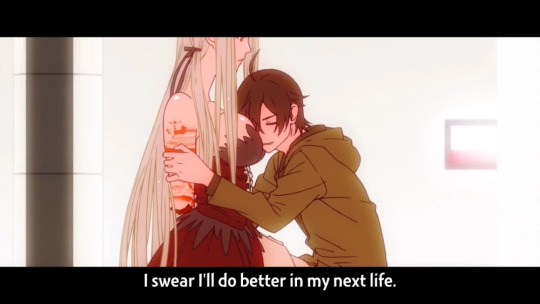
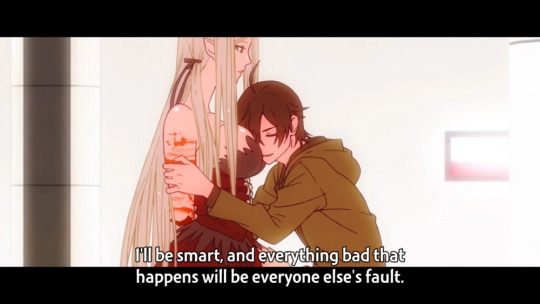
Araragi seems selfless to a fault, but he’s actually very self obsessed. While it’s true that Araragi desires to be a good person, and improve as a person, his methods for self improvement are faulty. He’s obsessed with appearances, and it’s more like he wants the appearance of a good person rather than actually having to put in the work at first. He wants to feel like he’s saved others. He wants to feel like he is someone worth something. He saves others because it increases his self worth, and also once again he gets something out of it. Araragi saving women that are weaker than him makes him feel special, like somebodyy needs him.
He wears the persona of a hero, rather than actually trying to be one. It happens again and again in the series. Despite the fact that Araragi actively does heroic things literally all the time, he also denies any role of being a hero because he does not want the responsibility of being one. Araragi wants the world to be burger king, he wants to have it his way. He wants the best of both worlds, Hannah Montana style. He wants to save girls, but he doesn’t want to be their hero and be entirely responsible for them.
“Araragi-kun, even if you can become a star, you can’t become a hero.” “I can’t become a star.” I shook my head. “I can only become a vampire.” And I even failed at that. “I see.” So you’re not going to be - my hero.
Nekomonogatari: White (Hanekawa and Araragi)
Take his actions in Nekomonogatari. Araragi claims it’s impossible to be a hero, he says that Hanekawa cannot be saved and calls for her to take personal responsibility and face everything that is wrong with her life. However, rather than trying to just support her with that difficult task Araragi immediately jumps to self harm.
It’s impossible for Araragi to become a hero, but he can swallow a katana and then trick Hanekawa into killing him because that is somehow easier than facing his feelings for Hanekawa head on. Araragi prefers bloody, painful self harm to the terrifying ordeal of being known. Araragi knows that Hanekawa is in need of help, but the fact that she is such a messy person different from the person he originally saw her as, makes him afraid of her.
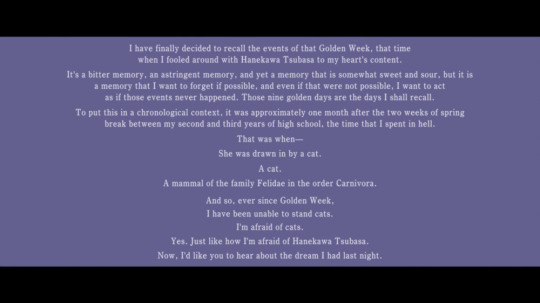
The thing is human beings are really sloppy. They are a messy gray, and Araragi wants to save them, but he really is just a kid out of his depth with a lot of things. He sees the abuse of Hanekawa’s household, and because he’s literally never even encountered an abusive life he gets so terrified that he runs away screaming. He does care about Hanekawa, but she’s far too complicated for him. He does not even want to touch that mess. It’s much easier for him to see Hanekawa as a hero, all black, or all white, then try to attempt something he does not know how to do and could screw up Hanekawa even worse.
Once again while it is not Araragi’s responsibility to fix an abused girl, and it makes sense a normal high school kid does not understand coping with abuse at all, Araragi at the same time wants to help her. Instead of just admitting that he can’t do anything for Hanekawa, he play-acts at being a hero.
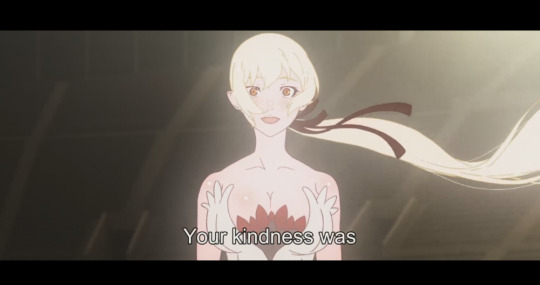
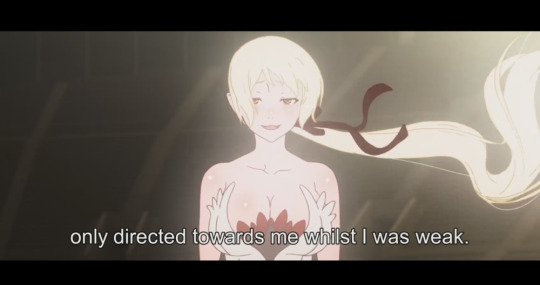
Here’s the thing about Araragi, have you ever once seen him try to save a boy? He only cares about helpless girls because those are the kind of people that heroes save. He does not care about people that are stronger than him, because then he is depending on them rather than the other way around. Araragi only interacts with about three male characters in the story significantly.
Oshino, who is an adult figure that Araragi aspires to be like, and then Kaiki and Seishirou who he both views as rivals for the two most important girls to him Senjyogahara, and Seishirou. Do you notice there is a far different tone in Araragi’s interactions with Seishirou and Kaiki? Araragi absolutely refuses to see Kaiki as anything other than a villain, and while Seishirou is clearly a victim, Araragi cares very little about actually saving him and instead prioritizes competing with him over Kiss-Shot.
Once again this is dude psychology that is present in Harem series. Did you notice if male characters do show up in harem series they are oftentimes, either comic relief, they are terrible people for the main character to look good in comparison, or they are old men mentor types. That is because any other man who would exist in a harem series is automatically competition for the girls. Araragi does not want to compete, he does not want to feel inferior to anyone else, because he always feels inferior all the time therefore he never has any male friends.
Therefore it’s hypocritical altruism, while Araragi is willing to help and that’s a good thing, he also never once helps unless there is something he gains from it. Even if it’s a chance to exercise his self loathing. Once again Araragi’s self loathing is incredibly harmful, he literally gets bones broken, limbs severed, and organs torn out almost every time he helps someone. Not only that but it’s always the first solution he jumps to. This is not the behavior of a healthy person, this is the behavior of someone attempting to punish themselves. Helping these girls by martyring himself is an act of attrition for Araragi, because he believes he deserves pain for all of his hypocrisies, but once again it’s still self obsession. Just hating yourself, just beating yourself up, is different from having to do the actual work of facing yourself and picking yourself up. Araragi will always choose dishonesty over honesty, obfuscation over seeing things clearly.
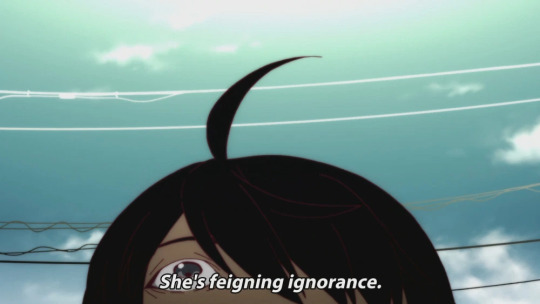
Araragi’s primary strategy of dealing with these many hypocrisies and contradictions in himself, and keeping his ‘ego’ in balance has always been obfuscation. Araragi is observant, but he presents himself as ignorant. He always goes on claiming how stupid he is, and how he’s nothing more than a worthless washout.
This is because Araragi was raised with an overpowering sense of responsibility. While his parents are not necessarily bad parents, they are police officers. He was raised made to feel responsible for things like justice, saving others, and especially made to feel responsible for his own flaws. Police officers are also symbols of justice, who as human beings often fall far short of the law and authority they are supposed to represent, because symbols are symbols and humans are humans.
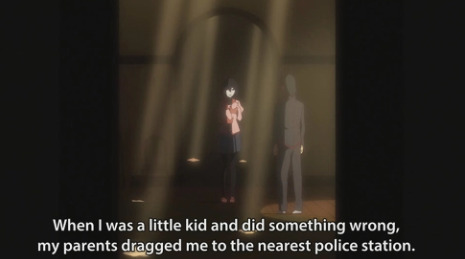
Therefore, what Araragi wants to avoid at all costs is feeling responsible. He wants to be important, but he never wants to take the responsibility of actually being important. This is his immaturity, the part of him that refuses to grow. For Araragi, if situations are too complicated for him to handle, or he fears his meddling will only make things worse and therefore he will be indicated as responsible his response is to just avoid it entirely rather than struggle or try.
This is shown in the case of Sodachi Oikura, once again someone that Araragi knew about and sympathized with but at the same time could not comprehend. Sodachi lived in horribly abusive circumstances, and both times Araragi encountered her he was a child. Araragi at the same time takes far too much responsibility, and far too little. It’s completely understandable that Araragi a middle schooler had no idea what to do to deal with what was obviously an abusive household, most adults are pretty useless when it comes to handling abused children. Yet, at the same time Araragi avoids any responsiblity whatsoever, he just forgets about Oikura claiming he has a bad memory depsite encountering her at three different significant parts of his life. Rather than struggle and fail, it’s better for Araragi to just not know anything at all therefore it can’t be his fault.
When Ougi drags Araragi through Sodachi’s case, Ougi ‘deduces’ everything, but Ougi’s catchphrase is I only know what you know. Ougi cannot have come to a conclusion that Araragi did not already know or was not capable of figuring out on his own, Araragi just did not think of those things because it was too painful to think.
This is also present in his dealing with other characters. There are several characters who have heavy romantic crushes on Araragi while Araragi is already in a relationship, Nadeko, Hanekawa, etc... Rather than ever just going through the awkward interaction of rejecting them it’s much easier to just pretend he never even notices their affections. Therefore we see him hypocritically, have a girlfriend, at yet at the same time constantly hang out with other girls who have a clear attraction to him and romantic feelings for him and never do anything about it.
Nadeko turns into a god because of obfuscation, both on Araragi’s part and on Nadeko’s. Nadeko is called out for what a hypocritical person she is never wanting to face anything directly, but that behavior is only a reflection, a foil to Araragi’s own, hence why Araragi was never able to save her.
Once again, Nadeko clearly has several problems with her personality, and she also blatantly hits on Araragi several times despite one being a middle schooler, and two Araragi having a girlfriend. Rather than just reject her outright, or acknowledge these parts of her personality, Araragi chooses to ignore everything and reduce her to being a cute girl. Nadeko puts on the act, and Araragi perceives. He then ignores all of her feelings, until they repress more and more and then bubble out into a jungian shadow expression that is Snake God Nadeko who just indulges on all of her instincts and desires and gives up conscious thought and her persona completely.
Ougi always mocks Araragi has a helpless fool, because that is what Araragi wants to be, helpless, foolish, and therefore not at fault when there are unintended consequences of his actions.
Finally, Araragi only thinks in black and white. This is also part of his obfuscation, he never wants to acknowledge how complicated people are. When he’s forced to confront the ugly side of people he almost always looks away.
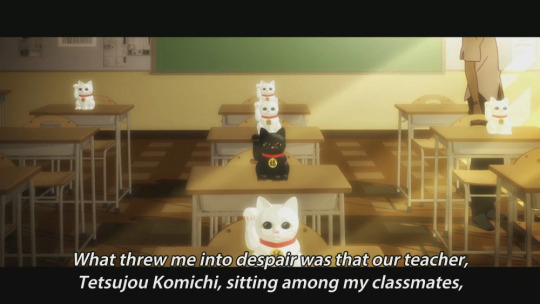
Black cats, white cats, hmmm, I wonder what that means. Araragi was only disappointed with the idea of justice, because he wanted to believe in it in the first place. He wants to believe that things like heroes can exist, and that his black and white perceptions of the wolrd are real. Araragi craves that order more than anyone else, perhaps even more than his younger sisters who just play at being heroes of justice. The reason he becomes so disillusioned is because he expects there to be an order of things, for their to be roles just like in a story, for their to be a sequence of events with meaning.
Araragi expects narrative rules to apply to real life. For life to have meaning. That is why he is a story teller. There are monsters and oddities, and humans with a clear line between them, despite the fact that Araragi himself is someone who blurs these lines by existing as a quasi vampire. Araragi’s life is a story that he tells himself, and that’s why it’s so important that his perceptions are so off. In Tsuki he even gets called on this twice, he calls his increasing vampirism punishment instead of just consequences for his actions and he’s told not to think he’s so special that god would go out of his way to punish him. Tadatsuru asks why they are facing off like this, why Araragi is protagonist and he is antagonist.
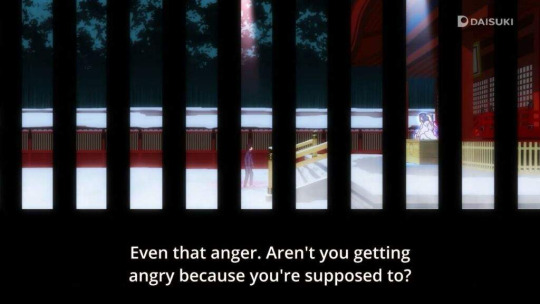
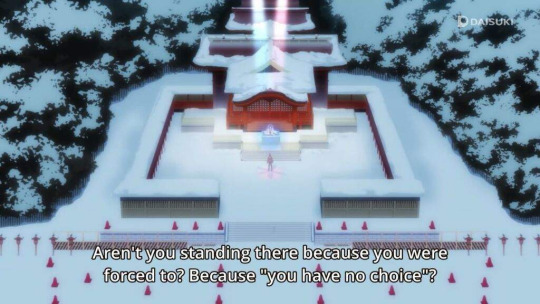
Araragi does not like acknowledging how sloppy the world is, because that makes him feel insignificant and weak. It would make anybody feel that way, because it means acknowledging that we are not as in control of things as we would like to be.
3. Oshino Ougi - They Reveal
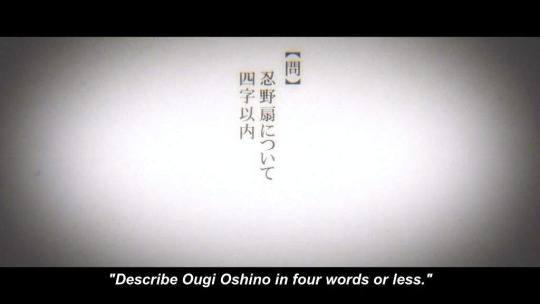
Ougi Oshino is Ougo Oshino.
They are a vague existence, Araragi refuses to define them because defining Ougi means defining themselves and that kind of confrontation is the last thing Araragi wants.
Ougi Oshino is born out of a desire for Araragi to punish himself, the same way he always seeks external punishment by allowing people to beat him up and rip out his intenstines. Rather than confront what is inside of him, Araragi externalizes it and confronts it as an external force which he projects upon.
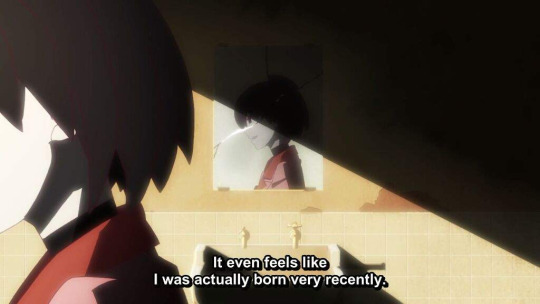
Ougi is a shadow born from the light of Araragi’s ego. It was not the darkness that created them, but rather Araragi himself and the shadow he cast. Therefore while Ougi can be seen as a corrective force, they actually embody all of those flaws that Araragi has, and their own character traits are always in response to those flaws.
Wheraes Araragi is a hypocritical altruist, Ougi is someone who exists to fix people’s mistakes, or punish them for their mistakes rather. Despite manipulating them, Ougi also ultimately leaves them up to their own fate. He leads them up to the cliff but does not push.
Ougi is a hypocritical fixer, because while he seems to be punishing others for their mistakes he really only exists to punish himself in the form of Araragi. All of the ‘mistakes’ he corrects are just Araragi’s own mistakes foiled in other people.
Nadeko is a foil to Araragi, she represents his own feigning of innocent and being unknowing. Kaiki is a foil to Araragi, he represents how much of a fake Araragi is by pretending to cling to ideals of justice and saving others but also denying them as well. Sodachi is also like Araragi, they both prefer to wallow in misery than try to work towards their own happiness. Araragi even says his famous line with his relationship with Shinobu, an ending where everyone is miserable, where nobody gets what they want. There are serious problems with his current relationship with Shinobu, a power imbalance, and both know they cannot last this way forever but rather than attempting to fix their relationship they both cling to the way thing’s are.
Repression and obfuscation is always favored over directly addressing the issues, especially the things which Araragi probably cannot control, or fix, like the complicated nature of abuse. Ougi claims they operate out of some imaginary set of rules that totally exist, but once again Ougi is the hypocrisies of Araragi laid bare. They are every bit the hypocrite that Araragi is.
They are just punishing other people who reflect Araragi’s negative traits. Those who do not acknowledge their shadow, will project their flaws onto other people and see themselves in other people in order to cope.
Ougi is made up of Araragi’s repressed desires. They are a girl he wants to save, which is the only type of person Araragi interacts with. At the same time, they are also connected to Oshino, who is Araragi’s model in the series for adulthood and maturity. Oshino who is always able to figure things out, and very self-collected often making fun of Araragi for his youthful excitement and his naivete for not knowing much about the world.
While Araragi presents himself as an idiot, Ougi is intelligent an capable of figuring things out from scraps of information. Araragi jumps to conclusions, Ougi is deductive and a good thinker. Ougi Oshino already knows Araragi better than himself, therefore Araragi does not have to carry any of the burden of self reflecting, or making himself known to other people around him.
During Ougi and Arraagi’s first meeting in the anime, he hallucinates that the classroom that he is locked inside of floods with water. The depths of the water, the shadow, dreams, these are all the realm of Jung. If the conscious mind is the water’s surface, then the subconscious is its depths.
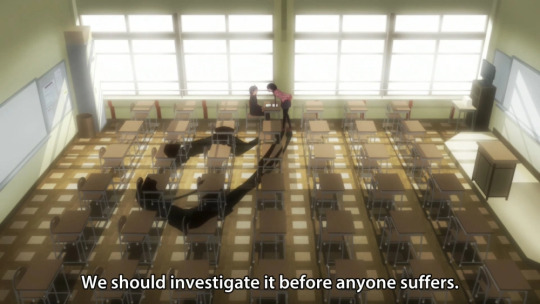
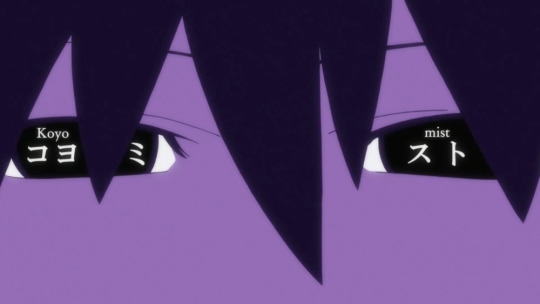
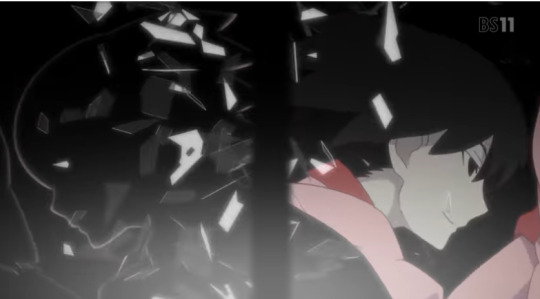
Araragi obfuscates, whereas Ougi reveals the uncomfortable truth. Ougi always positions themselves as a detective. In the realm of stories, it is the detective who makes the big reveal at the end. After all Ougi even says when they are locked in the room together, because there is no famous detective that Ougi themselves will play the role and announce the culprit.
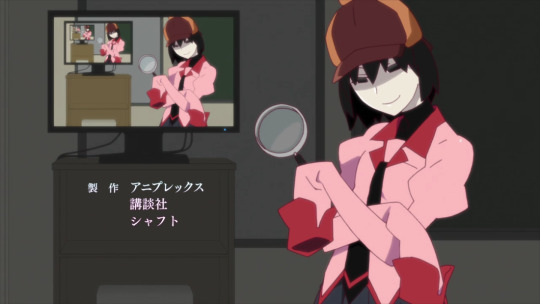
However, Ougi’s reveals are just as hypocritical as Araragi’s obfuscations. Ougi takes the shadow to be representative of the whole self, because they themselves are a living breathing Jungian shadow, but just like Jekyll and Hyde man is both. He is not one or the other, he is both at the same time. Ougi always act with the assumption that there is some kind of truth to be revealed, that this is just like a detective novel where there is a reveal waiting at the end.
Ougi takes the repressed desires to count as the “truth” of the whole mind, and ignores the conscious mind entirely. Therefore, in their view Nadeko is only capable of being a selfish cute girl who sees herself as a victim, Hanekawa is only something scary which Araragi must avoid. They at the same time as Araragi both read the same black and white narrative of the world. They do not care at all for the persona, or how people choose to present themselves. Desipte what Kaiki said to Nadeko that people can choose to be whoever they want to be, and they can try as many times as they like.
Ougi also views themselves as inhuman, and therefore incapable of doing anything, or defining themselves as anything outside of their role. Ougi is in a way, just as repressing of themself as Araragi is. They even lament this in front of Tsukihi, that once the detective reveals the mystery the novel is over. That if anybody would know the truth of them, they would come to hate them because they are abhorrent.
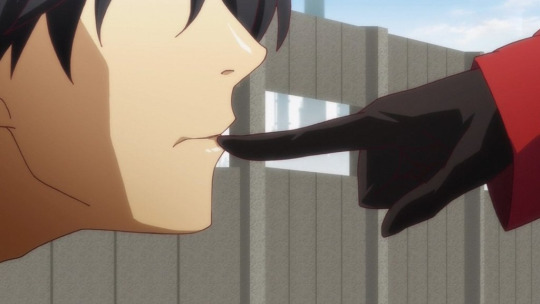
Ougi by repressing concious thought, silences other people and what they have to say about themselves. The only thing that matters is the repressed, what Ougi dictates as the truth must then become the truth. It’s just as much a limited way of saying the world as Araragi’s is. Hence Ougi’s famous catchphrase, I don’t know anything, you’re the one who knows. Ougi sees themselves as a person fundamentally incapable of knowing anything other than outside the bounds of what Araragi already knows.
Which is finally where the black and white thinking comes in. While the two of them seem like polar opposites, their views of the world are actually the same. Ougi wants what Araragi wants, for the world to exist like this is a story. For there to be roles, and order and most importantly meaning. The same way that Araragi just ignores things that fall out of step with their roles, when people contradict the way Araragi sees them he just pretends to be oblivious rather than see them as complex human beings. Ougi actively goes out of their way to punish people, for not playing the role in the story they were supposed to play. He acts like a corrective force, pushing people back into their roles. His wrongful assumption is not that people improve by “correcting mistakes” but rather there was a proper path in the first place. That there was a hero’s journey they were supposed to be going on. There is no path, there is no meaning, it’s all senseless but Ougi exists out of a desire for things to be sensible.
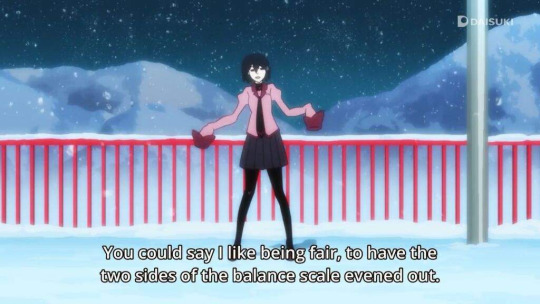

Ougi exists as Araragi’s opposite, because Araragi assumes that things like binary opposites exist in the first place. Heroes and villains, crime and punishment. They both believes these things exist in a fundamental order in the world, and they are not just made up values that humans invented and give meaning to.
“Let’s not joke. Virtue is the antonym of vice, not of crime.” “Are vice and crime different?” “They are, I think. Virtue and vice are concepts invented by human beings, words for a morality which human beings arbitrarily devised.” (No Longer Human, Osamu Dazai)
For both of them clinging to these hypocritical beliefs are better than the alternative, admitting to their own helplessness in the face of a world that is mostly indifferent to them.
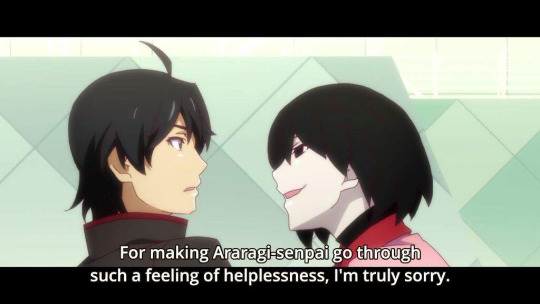
That’s why, when they are separate both of them choose to stick to their ultimately restricting and punishing roles, as protagonist and atagonist, persona and shadow, hero and villain, rather than just trying to acknowledge themselves and live as people.
Both is one, and one is both. Araragi Koyomi and Oshino Ougi have a relationship that ultimately results in not antagonism, but rather union and acceptance. Just like the King of Distortion is not an enemy of mankind in the enemy, Ougi was never an enemy to Araragi in the first place. Araragi never needed to hate himself or punish himself. The true path forward lies in union and acceptance.
You can never be anything more than yourself, nothing more and nothing left.
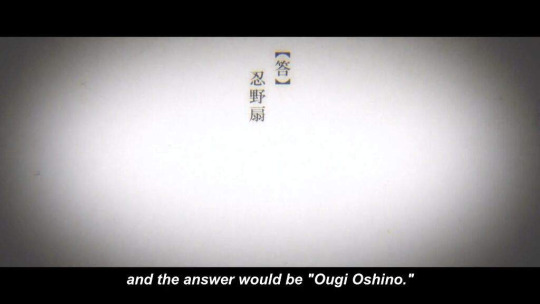
74 notes
·
View notes
Text
“No More Mr. Nice Guy
Dr. Jekyll is a good guy who plays by the rules. He reads books about religion, he does charity work, and he throws dinner parties for his bachelor friends—and though the phrase "bachelor party" conjures up images of Vegas and debauchery, the focus of these parties is science, religion, and literature (*stifled yawn*).
Dr. Jekyll eats his greens. He flosses daily. He makes his bed first thing in the morning. He never leaves his wet towels on the floor. And all this goodness is making him crawl out of his dang skin.
But Dr. Jekyll does have one nasty little secret: he longs to be evil and give way to many unspecified "appetites." His name perhaps provides a clue: "Je" in French means "I," while "kyll" = kill. The question is, what or whom does he kill? Himself? His appetites? His good side? His evil side?
After contemplating and analyzing these appetites of his, Dr. Jekyll decides that all men are both good and evil, and the clear thing to do is to try separating these two opposing facets:
It was on the moral side, and in my own person, that I learned to recognise the thorough and primitive duality of man; I saw that, of the two natures that contended in the field of my consciousness, even if I could rightly be said to be either, it was only because I was radically both; and from an early date, even before the course of my scientific discoveries had begun to suggest the most naked possibility of such a miracle, I had learned to dwell with pleasure, as a beloved daydream, on the thought of the separation of these elements. If each, I told myself, could be housed in separate identities, life would be relieved of all that was unbearable; the unjust might go his way, delivered from the aspirations and remorse of his more upright twin; and the just could walk steadfastly and securely on his upward path, doing the good things in which he found his pleasure, and no longer exposed to disgrace and penitence by the hands of this extraneous evil. It was the curse of mankind that these incongruous faggots were thus bound together—that in the agonised womb of consciousness, these polar twins should continuously be struggling. How, then, were they dissociated? (10.1)
Dr. Jekyll—who is apparently a scientist as well as a doctor—experiments with a variety of potions with this goal in mind. He eventually mixes a potion that, when consumed, turns him into Mr. Hyde. He morphs into another person entirely—an evil person:
The most racking pangs succeeded: a grinding in the bones, deadly nausea, and a horror of the spirit that cannot be exceeded at the hour of birth or death. Then these agonies began swiftly to subside, and I came to myself as if out of a great sickness. There was something strange in my sensations, something indescribably new and, from its very novelty, incredibly sweet. I felt younger, lighter, happier in body; within I was conscious of a heady recklessness, a current of disordered sensual images running like a millrace in my fancy, a solution of the bonds of obligation, an unknown but not an innocent freedom of the soul. I knew myself, at the first breath of this new life, to be more wicked, tenfold more wicked, sold a slave to my original evil; and the thought, in that moment, braced and delighted me like wine. I stretched out my hands, exulting in the freshness of these sensations; and in the act, I was suddenly aware that I had lost in stature. (10.4)
It’s important to note that Dr. Jekyll has a conscience. He knows what he’s doing is bad. He even admits that as Dr. Jekyll, he sometimes works to fix the harm that he caused as Mr. Hyde. But eventually, he just can’t help himself. He has to participate in a world of pleasure no matter what it costs him.”
18 notes
·
View notes
Text
PILOT: WELCOME TO SCANDEROON
“I learned to recognise the thorough and primitive duality of man; I saw that, of the two natures that contended in the field of my consciousness, even if I could rightly be said to be either, it was only because I was radically both.”
― Robert Louis Stevenson, The Strange Case of Dr. Jekyll and Mr. Hyde

"First I'll kill you, bitch."
The corpse beside him, draped in crimson robes and heavy golden jewelry, lay motionless. Its head—severed cleanly from its neck—had been cast aside like a small stone. Blood pooled onto the cold concrete floor, spreading beneath his shoes, but he barely noticed.
In his tired hysteria, Kyle Crane barely registered the Mother's lifeless body. All too focused on the only goal he had since entering the Countryside's dam.
He’d come too far and lost too much.
With his mind spiraling out of control, he rolled over to the thin vials he had dropped to the floor during his tumble. Dark blue liquid shimmering faintly under the dim light.
The vials were the answer. They had to be!
No, they were the cure! That cult leader lunatic was talking out of her ass. Only one way out? Turn on the nuke and kill off millions to save billions?
She genuinely believed it. Tried to convince the outsider, who trekked into their hallowed lands for an answer to the madness, to an outbreak leeching onto the nearby city, like a sane person. Spoke to him as though they were equals, as though he would see eye-to-eye with her and activate the fail-safe himself.
All because of some bullshit prophecy about a sun god—to free them from their suffering and this infection.
Like hell was he going to do that!
He’d heard enough sanctimonious speeches. Enough of ‘the greater good’ and 'the ends justify the means'. Enough of losing friends around him!
Enough.
Crane was done with this higher moral ground shit! He was finished with taking orders!
"...And save my friends…"
Get the vials, get out, and get back to the Tower.
That was his mission now, he told himself. Nothing else mattered.
"And you can rot in hell."
Crane’s goal was set in stone, even in his delirious, battered state. He had just fought—and barely survived—a talking, sentient, dangerous Volatile.
Every muscle in his body screamed at him to rest, but there was no time. People were relying on him. Relying on this medicine making its way home. There didn't have to be any more sacrifices!
So much had happened to him over the weeks—since he first parachuted into Harran. It was supposed to be a simple mission: get in, retrieve the GRE’s intel, and get out. But that all went to hell the moment he was bitten, throwing him headfirst into the thralls of the Harran Virus pandemic.
Where the infected hunted the living, where survival meant fighting tooth and nail every single day.
For days, he watched, he fought, and he survived. His entire journey led him to the Countryside, on a rumor that the people there weren't affected by the virus.
But what he found there was far from a solution. It was more than he bargained for. More than what he wanted to know. And, as always, things spiraled out of control. They always did.
A final, brutal confrontation with the cult leader in the dam’s hold. He had struck the final blow, victorious.
But he didn't come out of the fight unscathed. He could feel it snake painfully through him. Something was wrong with his head. Something wasn't right with his legs. It was fatigue, wasn’t it? He barely got out of that fight alive!
It’s fine, he told himself. The battle was over. His long journey could finally end, and just maybe, it could be over with the outbreak! Nothing was going to stop him now: not Rais' men, not the infected, not even the Mother.
She was as good as dead, and he could finally save everyone at the Tower!
He wanted to laugh out loud. But the burning in his lungs wouldn't let him. It didn’t matter. He could laugh when he was outside.
Focus. His mind screamed at him to stay sharp, to fight through the haze. You have to do this, he reminded himself. Everyone counted on him!
And that was all that mattered now.
The weakened runner scrambled for the vials and picked the first one with trembling hands. He spared one second to glance back—half-expecting the dead body behind him to rise back up without a head. When it didn't, he snatched the second vial. Then a third, just to be certain.
Three vials. Secured in his hip pouch. That was all he needed.
He pushed himself to his feet, his body swaying as he staggered his way for an exit.
Out of the dark, damp dam.
But the world around him refused to cooperate. Or was it his own failing body?
But things were making it hard on him. Or was it himself? The walls around him twisted and blurred into a nauseating, dizzying soup of colors and shadows. He was almost swimming in it, every step an effort of will.
Don’t stop. Don’t you dare stop. He couldn't afford to waste any more time.
Then the visions hit.
He was gone under in agonizing seconds, like plunging into icy water. Snarling faces filled his vision, feral and violent. Lunging at him with teeth bared and hands outstretched to kill him. Their eyes burned with rage. They screamed at him for leaving them behind. For abandoning them!
But his body kept going. Once he surfaced back to reality, he stumbled forward, clumsily colliding with a stack of white containers. He didn’t recognize this part of the dam.
How had he even gotten here?
"You can't change anything, Kyle."
The colors around him warped again, twisting into iridescent, prismatic spheres. Again, he went down. Like drowning—sinking to the bottom of an endless ocean, and he was clawing back up for a breath of air. A set of old mattresses softened his lumbering fall.
Something was wrong— very, very wrong.
"I… I killed you! I fucking killed you!"
Where was she? Where?! His frantic eyes darted around, searching the shadows. He’d find her—he had to—and he’d do it again if he had to. Again and again until she stayed dead.
"You'll see for yourself…"
The colors warped around him into shiny prismatic spheres. Again, he went down. Like drowning at the bottom of the ocean and he was clawing back up for a breath of air. A set of old mattresses softened his lumbering fall.
"I… I killed you! I fucking killed you!"
Where was she? Where?! He'd find her and do it again if he had to!
"This is a poison…"
"It's not a poison!" Crane snapped. His rage faltered into desperation as he fumbled for a vial. He yanked it from his pouch, clutching it tightly, as if to anchor himself. He stared at it, his breath ragged, to calm himself down from losing to insanity. "It's a cure!"
His fingers squeezed the vial, the cool glass pressing into his palm. It was real. N ot an illusion! This was it: the key to everyone's problems!
"Lena?" His voice cracked as he activated his radio, slipping the vial safely back into his pouch. "Lena, I'm coming back with the medicine. We'll be able to help everyone now! Tell Camden that he has all the time in the world… No! Tell him that we have a new lead… A better one…"
Again, he went under. Crane wasn’t sure if his words reached her. His world fractured again, the flashes getting worse—the familiar faces screaming at him. Tortured him with their accusations.
That he betrayed them.
That he abandoned them.
All of the failures he’d tried to bury came roaring back at him. When he gasped for air once more, he found himself by a barricade of blue containers. He heaved himself over them to see a ray of hope gushing down a manhole.
A way out. A ladder. At the end of the tunnel. Out of this damp sewage-soaked tunnel.
With every ounce of determination left in his body, Crane pushed forward. Ignored the flickering faces that flashed in the corners of his vision.
The masks, the symbols, the crazy fanatics? They were gone. That damn Mother’s voice in his head was just an aftereffect from having his brain smashed up inside—that was it. Because she was silent now, no more of her whispering.
Replaced by something else. He couldn't hear it, but it lingered in the back of his mind.
A scratch. A faint, nagging sensation in the back of his mind, like the echo of a thought he hadn’t formed.
Just go, Kyle. Get out of here.
Out into the blinding light.

Once the delirious runner climbed up to the surface, everything became relatively clear in his head. The blurriness had stopped, and he found himself feeling like he had woken up from a bad dream and into a surreal one.
Crane blinked, taking in his surroundings one he emerged out of the manhole, at the edge of a playground.
There were no hissing walkers hiding in the tall crops, no rotting carcasses littering the streets. The sprawling farmlands and congested urban ruins of the Countryside were nowhere to be found.
Instead, he was greeted by cozy suburban serenity. With neatly trimmed lawns behind picket fences. The sun beamed down on the scene, casting everything in a golden, idyllic light.
It felt... wrong.
He searched his surroundings again. No infected. No cries for help. No signs of the outbreak.
The only movement Crane saw was across the playground. Two kids, a boy wielding a toy sword and a girl, played around the jungle gym while an adult—maybe their mother or older sister—was watching nearby.
"Where am I?" he murmured.
It all felt alien. After everything he’d been through—everything he’d seen in the Slums and the countryside—none of this peace felt real to him. Did he just wake up or something? Or had he been dropped into a world where the virus never existed and everyone was moving on with their lives?
No... That would mean moving on after so many deaths in Harran. He couldn't accept that.
"Oya! Time to go home!" he heard the woman call out, snapping him from his thoughts.
Crane hopped down into the park, his legs unsteady but his mind racing. Maybe the family there could fill him in on the details. Where he was, what was happening—anything to make sense of this. He needed to know.
And he needed to get to the others pronto -
The visions flashed violently again in his head, violently. A split second—an infected woman launched towards him with bared, bloodied teeth for a split second.
And her face…it looked familiar.
"Aaaaa!"
The sharp cry pulled him back to reality. One of the kids pointed at him with a tiny trembling finger. They looked directly at him with wide, terrified eyes. Why? Both children rushed over to the lady, like frightened chicks seeking shelter under a hen’s wings.
"W-What?" Kyle muttered, stumbling a step forward.
He reached out-
And gasped at the sight before him. At his outstretched hand...they shouldn't be his hands.
Molten orange veins ran through his arm, glowing out of disgusting blackened, crusted skin that looked more like charred stone than flesh. His fingers had warped into deadly talons.
He had seen these kinds of hands. Only at night. These weren't his hands!
But they were attached to him.
What...what is happening?
More screaming around him. At him.
He wanted to calm them down. He wasn't a threat! He was trying to save people, not hurt them!
But nothing came out of his throat. It was as if something deep within had started to take root in his subconscious and had stolen his voice for something... much more sinister .
Shout out your name, Kyle! Do something! To confirm that he was still human.
That he was still inside!
Someone please hear him!
Then his eyes caught movement—a dimming of the enormous light above.
The sun was sinking, slipping behind the suburban houses. And just as it slowly descended behind the houses, something crept deeper into his mind. Settling into every corner of his grey matter and making itself at home.
It was foreign. Primitive.
Hungry.
His instincts screamed that this wasn’t right. Kyle Crane wasn’t in control anymore.
Dark whispers telling him to embrace it. Tear, rip, kill. Getting louder and louder as the night stretched its claws over the quiet suburb.
His instinct screamed at him this wasn't right. Kyle Crane wasn’t in control anymore.
He turned back to the family, his heart screaming at them to run! To get away from him! But when he opened his mouth, a snarl came out instead.
The unknown energy was building up inside his muscles, aching for release. Readying him for the hunt. Sink his teeth into flesh.
And that something in the back of his mind murmured at him. Low, toxic, and insidious.
Look over there. At the playground.
They were easy prey.
Get them.
No. No, no, no!
He tried again to scream.
RUN!
But the only sound that came out of his mouth was the bloodcurdling howl of a monster into the fading light of day.

Three months later...
"Hm-Hmm-hmm!" hummed the chirpy, upbeat hum, bouncing off the damp, moss-covered walls. An uncanny melody of sunshine in stark contrast to the shadows and rot.
Along the tunnel banks lurked the rabid walkers—Biters. Infected husks of humanity, driven for the taste of human flesh, snapped their decayed heads to the humming. And just like animals alerting to any new sound and smell, their grunts and guttural snarls grew louder toward the source of the disturbance.
Vroom, the small motorboat’s engine growled. Painted in bold, chipped script on its starboard was the baptized name, Caroline. She glided over the gentle ripples—and over the bloated corpses, each body bumping against its hull with a loud thud.
The engine's noise, the portable radio's music, and the light humming. Something had entered the tunnel—into the freaks’ dark home from the sun. The Biters lashed out at the source, only for them to lose their balance and clumsily fall into saltwater.
Their decaying limbs reached toward the boat like trapped rats clawing at the sides. But it was a losing battle to stay afloat.
The cold water embraced them, dragging them down into silence.
The upbeat beats continued to play from a portable radio on the boat’s dashboard, drowning out every bump, every thrashing and every snarl. The driver seemed unbothered, humming along as if taking a leisurely ride.
And even if danger did present itself, the woman in an eye-catching red jacket was ready.
Her fingers tapped rhythmically to the beat of the music, her hazel-blue eyes—shielded by orange-tinted sports sunglasses—focused on what was ahead.
To the end of the tunnel.

Story continues on at these Links: AO3 and FFN
#Dying Light#Dying Light Game#dyinglight#DL: The Descent#fanfiction#dying light fanfiction#pilot#chapters#Kyle Crane#the Following#spoilers#oc#Mad Jack#fanfic#dying light fanfic#Prologue Arc
3 notes
·
View notes
Text
However, although we are encouraged to think in terms of duality by the oppositions of Jekyll and Hyde and of Dorian and his portrait, the texts also imply it is not simply a split that is at issue but a more complex fragmentation of the subject. As Dorian suggests, man may well be not a stable unified subject, but a ‘complex, multiform creature’. Multiplicity, an even more disturbing concept than duality, is repeatedly suggested in decadent Gothic texts through the representation of metamorphic bodies or what Kelly Hurley (1996) identifies as the ‘abhuman’. The abhuman may be a body that retains traces of human identity but has become, or is in the process of becoming, something quite different. Alternatively, it may be some indefinable ‘thing’ that is mimicking the human, appropriating the human form. Either way, it is the integrity of human identity that is threatened; these are liminal bodies, occupying the space between the terms of such oppositions as human and beast, male and female, civilized and primitive.
David Punter, Glennis Byron, from The Gothic
1 note
·
View note